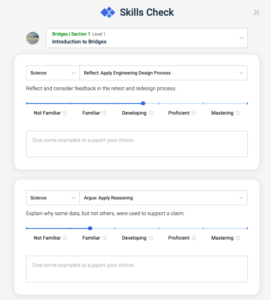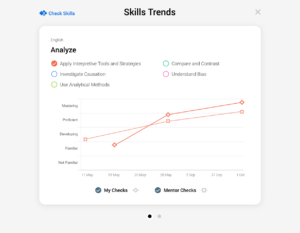Skills Check: Putting Students in the Driver’s Seat
Drivers Ed teaches new drivers all of the functions of driving (applying the gas, brakes, steering, etc.), as well as the rules of the road and navigation. Drivers Ed also instructs new drivers to check the rearview mirror every 5 seconds. Why? Because where we have been is just as important as where we are going. Like a rearview mirror, the Skills Check feature, available anytime students work on courses and quests, helps students and their mentors gain awareness of where they have been and what they have learned, but also points to where they need to go.
Skills Check provides just one of the opportunities students have in Quest Forward Learning to be drivers of their own learning and experience. Both mentors and students complete skills checks. They are useful tools for reflecting, communicating feedback, and tracking progress in skill development. By pausing frequently to reflect on their skill progression, students always know how they are doing at any given time, and are aware of where they are going.
Here are some of the additional reasons why students, in addition to mentors, should regularly check skills:
Skills checks allow students to be active participants in their own learning process. Students can check their skills any time they’d like—after completing a quest or creating an artifact, at the end of a level or course, or even in the middle of a quest when they are starting to get the hang of a skill. This is part of the learning process, not something a mentor completes for them when their work is already finished. To complete a skills check, students have two options: select the skills they want to reflect upon (selecting a point on a slider that shows how well they have demonstrated the skill and associated behavior), or select a quest and check that quest’s associated skills. They also have the option to write a reflection.

Once a skills check is complete, students see a graph highlighting both their evaluations and their mentor’s evaluations over time. They can quickly see how they’re progressing and what areas might need more work. (For more information, see blog post Learning and Improving with Authentic Assessment)
Skills checks promote student-mentor discussion. Students can monitor their skills on the student “Skills” page in the Quest! app. This page displays student and mentor responses together, which guide discussion about student ability and progress and any discrepancies between mentor and student perceptions. This feedback provides a clear focus for discussions.

One example of these conversations is from Sarah Earnest, Science Mentor at Quest Forward Academy, as she shares how the skills check prompt great discussion in her classroom:
“Honestly, I have been really impressed with the thought and care with which students have been completing skills checks. Usually, I see that students have rated themselves similar to how I would have rated them. This shows that they are fully embracing the skills system and being honest with themselves. However, there have been a few times where a student has rated him or herself as either too low or too high. When this happens, it’s usually because they don’t really understand the skills. After explaining what the skill means, They’ll usually exclaim, “Oh that’s what that means, I’m bad at that!” or something like that. Together we usually agree on the new rating.”
Skills checks help students develop critical thinking and reflection skills. Students need to be deeply familiar with the skills they are working on and developing. These are the primary goals for the courses and quests they complete. Estacy, a freshman at Quest Forward Academy Omaha, says that she likes how the skill checks after each quest help her track her growth.
“Sometimes it’s hard to see what skills I am using when I am in the middle of working on something. I like doing the skills checks at the end of each Quest, because it helps me realize the skills I am using as I am completing quests and creating artifacts. I am actually glad that our mentors won’t let us move onto the next quest without completing a skills check, because it helps me slow down and see how I am getting better at certain skills.”
Beyond handing over the keys to students for their own educational experience, the Skills Check feature in Quest Forward Learning ultimately builds students’ self-awareness and prompts great discussions between mentors and students. This process equips students with the ability to monitor themselves and their own progress, so that when they are ready to hit the road that lies beyond high school, they will head in the right direction.
